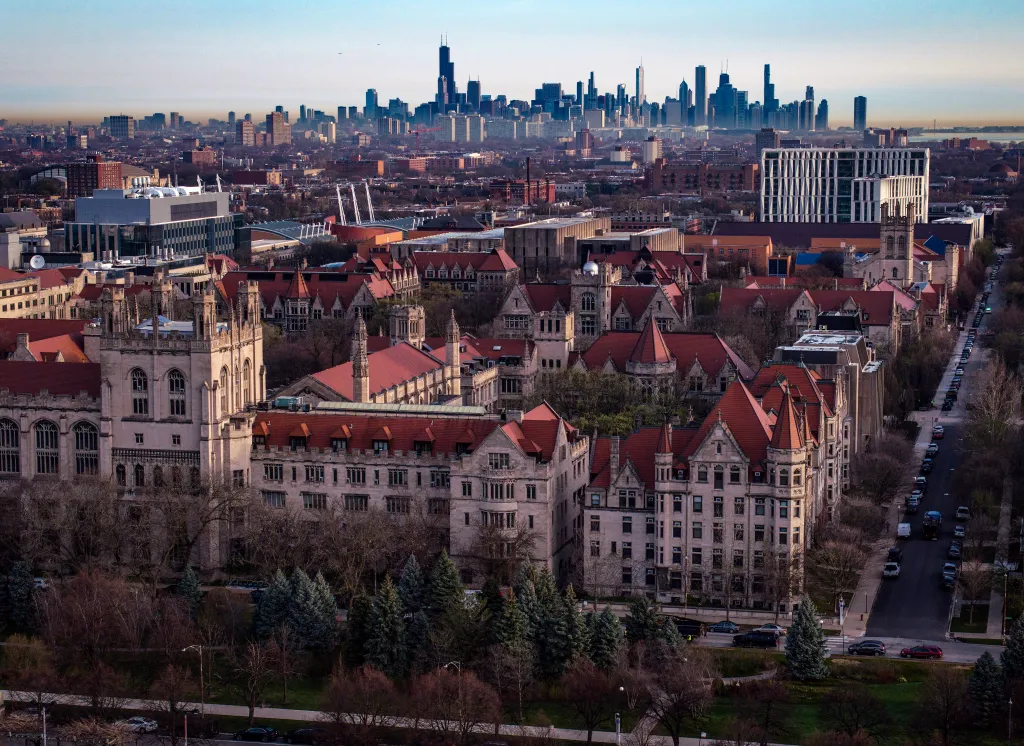
For more than 130 years, the arts and humanities at the University of Chicago have played an important role in the evolution of those fields in America and across all of higher education. It is a legacy of great accomplishment, but also profound and necessary change.
This context is helpful to keep in mind amid recent, anxious commentary about a “retreat from the humanities” at the university and elsewhere. As fields of study, the humanities can never be contained within a final, completed form. They must be responsive to the constancy of change.
I’ve seen this firsthand, having spent almost three decades at the university as a faculty member in the department of English language and literature, and now as dean of the Division of Arts and Humanities. Since my department’s founding in 1892, it has branched out from an early focus on rhetoric and oratory to include fields such as creative writing, Black studies and environmental humanities. Faculty members now teach “Beowulf” and John Milton alongside contemporary theater and literary theory, and everything in between. As the world has demanded different kinds of knowledge, scholars in the arts and humanities have generated new and inspiring ways to understand the human condition.
The pressures on the arts and humanities today are real and in many ways unprecedented. But we won’t build a stronger future for these beloved subjects by treating them as static or frozen in time. Success will require imaginative thinking, engagement with a changing culture and a renewed commitment to collaboration across disciplinary boundaries. Luckily, that is exactly what we do well.
As someone with a lifelong love for the arts and humanities, it pains me to see mischaracterizations of efforts to place these fields on a stronger footing at U. of C. No, we’re not replacing instructors with ChatGPT (to name one strange rumor), and we’re certainly not removing the arts and humanities from the center of academic inquiry. The university has a website debunking some of the most glaring inaccuracies.
On the contrary, my colleagues and I are more determined than ever to champion the arts and humanities during these uncertain times. The university’s Division of the Arts & Humanities is home to more than 200 tenure-track faculty members — one of the largest humanities faculties in the world — whose work engages nothing less than the full scope of human culture. In any given year, we teach over 50 languages, far more than all but a few institutions — and that is not going to change. Our small class sizes and broad scope of course offerings attract incredibly talented students — in 2025, a third of all undergraduate degrees at U. of C. included a major or minor in the arts and humanities.
Such a deep commitment to the arts and humanities, essential as it is, requires extensive resources. Despite claims that the humanities are the “least costly” disciplines, we could not do our work without a generous subsidy from the university. This is true for nearly all research-intensive arts and humanities units across the country, in part because they lack large federal research grants to help support Ph.D. students, postdocs and faculty salaries.
Moreover, virtually every academic leader in the country is confronting financial hurdles from this year’s abrupt federal policy changes. At U. of C., this has added to our existing budget challenges. We can no longer adapt simply by adding; continuing to build new departments and centers on top of inherited structures is neither effective nor sustainable. As a temporary measure, our faculty made the difficult call this summer to pause Ph.D. admissions in most arts and humanities departments for one year as we develop a long-term plan.
But we also see this challenging environment as a call to action.
In recent months, more than 50 of my colleagues have been working to plan for the long-term vitality of the arts and humanities at U. of C. It’s important that we do this well, because the wisdom and creativity of the humanities offer invaluable ways to grapple with some of the most pressing issues we face, such as: How can cultural and historical insights inform how we navigate the impacts of climate change? How does our understanding of language shape artificial intelligence, and how does AI change our understanding of language, truth and other concepts at the core of the humanities?
Not surprisingly, these are questions our students want to pursue too.
I believe leaders in higher education need to help students and scholars pursue these kinds of ambitious work — for the future of the humanities, but more importantly, for the future of small “h,” big-picture humanity.
Such work cannot thrive on nostalgia for an imagined golden age. While U. of C. has produced many formidable figures in the arts and humanities over the last 133 years, we should remember that they changed ways of thinking only by refusing to accept the existing order of things.
This is a time to take up that challenge again.
Deborah L. Nelson is dean of the Division of the Arts & Humanities at the University of Chicago, and the Helen B. and Frank L. Sulzberger professor in English language and literature.



